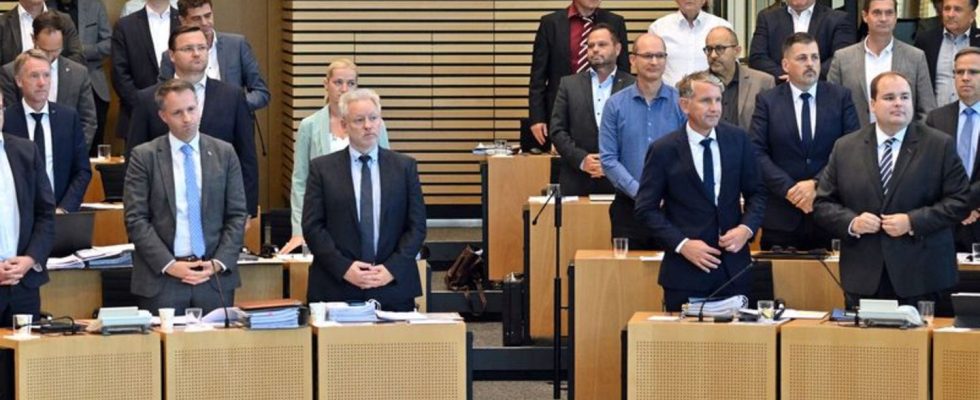Vote in the state parliament
A turning point or double standards? Why the Thuringian vote between the CDU and the AfD is so controversial
Members of the CDU and AfD vote together on the property transfer tax in the plenary hall of the Thuringian state parliament. photo
© Martin Schutt/dpa
Is the firewall now gone? After the AfD votes for a CDU proposal in Thuringia, the SPD general secretary fears a parliamentary turning point. Another, whose party also voted, denies any responsibility.
After the tax cut in Thuringia, which was decided with the help of the AfD, the CDU in the fire of criticism. The SPD, the Greens and the Left are outraged. The FDP chairman Christian Lindner, whose party voted with the CDU and the right-wing extremist AfD in the state parliament, assigned sole responsibility to the Christian Democrats. Only the CSU stands by its sister party.
What happened?
The opposition CDU was able to push through a reduction in the real estate transfer tax in the state parliament because the right-wing extremist AfD, the FDP and non-attached MPs agreed. Prime Minister Bodo Ramelow, the only head of government of the Left Party in a federal state, does not have a majority in the state parliament with his red-red-green coalition and is fundamentally dependent on help from the opposition. The real estate transfer tax is due when purchasing real estate. It is one of the highest in Thuringia and is now falling from 6.5 to 5 percent.
What is the criticism?
Björn Höcke’s Thuringian AfD is one of the party’s most radical associations. The country’s Office for the Protection of the Constitution classifies him as a proven right-wing extremist and is monitoring him. “(CDU leader) Friedrich Merz has repeatedly said that there is no cooperation with the AfD. Today we set off together,” criticized SPD chairman Lars Klingbeil on ARD. SPD General Secretary Kevin Kühnert sees a taboo broken: “If this becomes a pattern in the CDU, then parliamentarism will be different after today. Democrats must never make the AfD the parliamentary tipping point.”
The AfD, on the other hand, is rubbing its hands. “Merz’s firewall is history – and Thuringia is just the beginning,” wrote party and parliamentary group leader Alice Weidel on the X platform, formerly Twitter.
Didn’t the Thuringian FDP also vote with the CDU and AfD?
Yes, FDP leader Lindner rejects his party’s shared responsibility. “Now we don’t want to confuse cause and effect,” said the Federal Finance Minister at an interview event with the “Augsburger Allgemeine” (Friday) at the newspaper’s headquarters. It was a request from the CDU parliamentary group. “That’s why it’s now the CDU’s responsibility.”
The chairwoman of the FDP youth organization Young Liberals, Franziska Brandmann, also directs the main accusation at the CDU: “It is forbidden for upstanding democrats to start political initiatives whose success depends on the support of right-wing extremists.” But she also told ARD: “Civic politics must be done without the AfD. Period. Representing and defending this principle is particularly the responsibility of the Union and the FDP as bourgeois parties – in Thuringia, where this is not the case today worked and beyond Thuringia.”
How does the CDU justify itself?
Its state chairman Mario Voigt sees the implementation of the tax cut as a measure to win back dissatisfied voters from the AfD. “People are fed up with these political games, but what they want is for their concerns to actually be taken care of,” said the state parliamentary group leader on ARD. “We have to convince people with content, then we can win them back from the margins.” He reiterated: “The CDU’s compass is clear: we do not work together with the AfD.” There are said to have been no agreements with her before the vote.
CDU federal leader Merz had already said that the CDU would introduce a reduction in property transfer tax in several state parliaments and would not make itself dependent on other factions. CSU boss Söder thinks that’s right: “He’s right,” said the Bavarian Prime Minister on RTL. “Incidentally, it would be up to the other democratic parties to support this good idea of a tax cut, because relief for citizens is nothing extreme, but rather sensible.”
How does red-red-green govern in Thuringia without a majority?
With support from the CDU, among others. His party is doing constructive opposition work, said Voigt. He accused the critics of double standards: “The red-red-green minority government passed several resolutions in this parliament only with the votes of the AfD and thus received the majority. And that shows that these double standards don’t work.”

